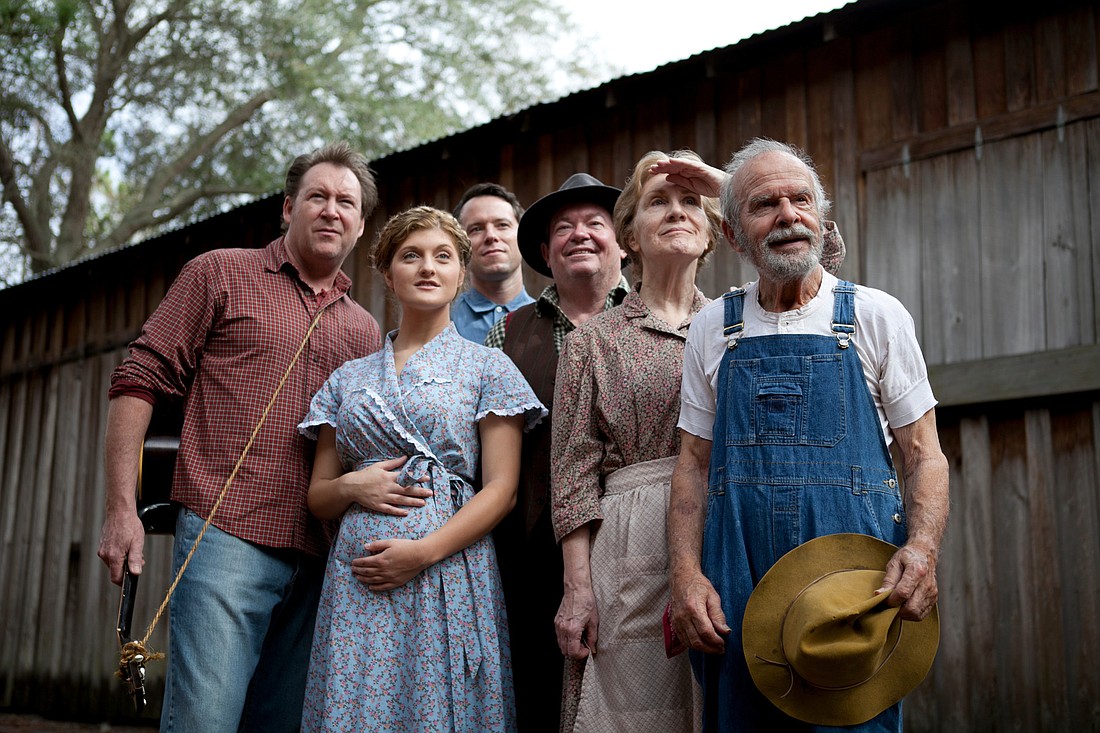- April 25, 2024
-
-
Loading

Loading

Once upon a time in Oklahoma, the weather went haywire, the rain stopped, dust storms blew away the top soil, crops failed, farmers couldn’t pay their mortgages, banks foreclosed, and Oakies fled to the promised land of California. This Dust Bowl exodus might have been a historical footnote to the Great Depression if it hadn’t been for John Steinbeck’s 1939 novel, “The Grapes of Wrath,” which follows the flight of the Joad family to the Bear State. Frank Galati’s adaptation is now playing in an Asolo Rep production.
It’s a masterful adaptation of a massive novel. Like any adaptation, it’s a distillation. Galati left stuff out and put stuff in — including a few things I would have left out. But, most of the dialogue, scenes and themes are straight out of Steinbeck. The playwright is faithful to the book’s spirit.
“The Grapes of Wrath” has been compared to Exodus. Unlike God, 1930s California growers did not keep their promises. They blanketed Oklahoma with flyers promising a land of milk, honey and good jobs — a scam. But thousands of disposed tenant farmers believed it. They’d pull up stakes, arrive in California and find a few hundred jobs at starvation wages — take it or leave it. Sad history. And, if you know a little history, you know what the Joads are in for. They are on a road to nowhere. You know it, but you’re still swept up in the journey.
“The Grapes of Wrath” wants to be a road picture. (Thanks to John Ford, it was, in 1940). Director Michael Donald Edwards and Production Designer Scott Bradley do a fantastic job of conveying a sense of forward momentum in the confined rectangles of a proscenium arch and stage. The Joads’ jalopy swivels on a turntable. You see the effect, but still believe the rattling thing is moving in space. Edwards also nicely conveys the cost of the journey, the slow attrition, the growing body count, the wear and tear. (If I’m not imagining it, Costume Designer B. Modern subtly dirtied and distressed the characters’ clothes as the play progressed.)
The actors fully sell you on the hard miles they’ve traveled. Christian Conn gets to step into Tom Joad’s iconic boots. But he doesn’t play it iconically. He’s not Henry Fonda’s larger-than-life workingman’s Christ.
Conn’s character is life-sized — a tough, smart, decent guy, who doesn’t want to fight but will if pushed. Peggy Roeder is equally fine as the equally iconic Ma Joad. Again, she portrays a person, not an archetype. (Roeder’s character is hilariously human when she finally loses her temper at a pushy holy roller.) Andrew Sellon is layered and self aware as the un-born-again Rev. Casy, who’s lost his old-time religion, found a new one and ultimately passes it on to Tom. Kudos also to Kristen Lynne Blossom (as Rose of Sharon, Tom’s increasingly pregnant sister), Douglas Jones (as a laconic Pa Joad), David Brietbarth (as the drunken, loving, guilt-riddled Uncle John Joad), David S. Howard (as Grampa Joad, a trash-talking natural comedian, who sadly dies too soon) and Carolyn Michel (as Granma Joad, his sweeter, better half, who soon follows). All in all, 28 actors bring Steinbeck’s Oakie odyssey to life. Along the way, the journey is punctuated by Woody Guthrie-esque folk music, performed by Tim Grimm (the composer), with Carmela Pedicini and Sara Moone on banjo and fiddle. The song asserting “We don’t want handouts or charity” was particularly moving.
This small army of talent creates plenty of feel-good moments. But don’t expect a happy ending. We know the road is a dead-end from the start. What the road does to the riders is what counts.
The Joads suffer, all right. But they endure. Sure, they’re fictional — as achingly symbolic as the cast of “Pilgrim's Progress.” But they stand for flesh-and-blood people. Watching this play, you can’t forget the real-life Joads, and not only the ones in the 1930s. They’re still out there, traveling hard roads on our planet right now.
If their journey doesn’t move you, you’re made of stone.
IF YOU GO
“The Grapes of Wrath” runs through April 19 at the FSU Center for the Performing Arts, 5555 N. Tamiami Trail, Sarasota. Call 351-8000 or visit asolorep.org for more information.